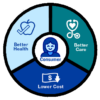The Challenge
Being an independent cardiologist in private practice is growing more difficult as the healthcare landscape evolves and value-based care (VBC) takes root

- Practice cash flow is being squeezed with revenue and charge capture leakage, payers adding more reimbursement roadblocks, and rising practice expenses

- Practice management is increasingly complex with more demanding patients and staff, endless administrative tasks, changing regulation and payer rules, and new technology

- Shortages of cardiologists, APPs and staff are adversely impacting operations, wage expense and growth

- Health systems employ 75% of cardiologists in competition with private practices and in pursuit of market dominance

- Private equity investors are acquiring and consolidating large independent cardiology groups and investing in them to take a lead in VBC in their local markets

- Medicare’s push to value-based care from fee-for-service has begun in cardiology and will require practices to make significant operational changes and investments

- Rapidly advancing technology and AI that support clinical care and automate key processes are complex and expensive to implement and leverage

- Physician compensation will decline unless these challenges are addressed by practices becoming more efficient, effective and competitive

Independent cardiologists are being overwhelmed by these market drivers and administrative burden. They must prepare now for the multi-year transition to value-based care and deployment of AI or risk being left behind. Yet they lack the expertise or resources to effectively manage these changes and are already suffering diminished quality of life and career fulfillment. The CardioCare Network provides practices a comprehensive solution to address these challenges and benefit from the new landscape.

Our Solution
Our national network of cardiovascular private practices empowers independent cardiologists to practice at the top of their license with high clinical effectiveness, productivity, career fulfillment and competitive market advantage
- Retain clinical autonomy and full practice ownership
- Focus on patient care with our innovative clinical models, care coordination, seamless transitions and advanced technology to drive superior outcomes and service
- Optimize practice performance in patient satisfaction, staff hiring and retention, growth and cash flow
- Thrive in value-based care with risk-based contracting, population health management and real-time analytics
- Delegate the administrative burden including staff and practice management to CardioCare Network
The CardioCare Network offers turn-key and custom solutions that employ its scale and shared resources to allow member practices to extend their capabilities and better serve their communities. We partner with physicians to manage their practices and free them of administrative burden so they can focus on their patients and practice growth.
Together as a network, practices have more collective power to steer market evolution in their favor, successfully compete in value-based care, and revolutionize cardiovascular medicine. Driving this collaboration forward with a great sense of urgency will be important to preserving independent cardiologists and their practices. This starts with growing the Network in each local community and developing and executing a strategic plan customized for each practice that positions them for success with the support and guidance of the Network. We can provide an initial evaluation and then a full assessment to determine the benefits of the Network for your practice.
Ultimately, each practice in the Network will increase its enterprise value with implementation of these improvements. Individually, practices gain more value working together as a group. This joint value can potentially be tapped for funding the practices in the future. This enables practices to retain and grow the full value of their enterprise without giving up value to private equity groups or other outside investors
The CardioCare Network serves:
- Independent cardiologists and private cardiovascular practices that are not funded by private equity
- Cardiologists employed by health systems that want to transition to private practice to regain their independence and autonomy
- Payers and health systems seeking to align with cardiovascular providers in value-based arrangements

Our Services
The CardioCare Network proactively manages practice administration, operations and staff for independent cardiology practices and hospital-employed cardiologists seeking to open a private practice with this comprehensive set of services
Practice Operations

- Operations Optimization
Implement best practices with streamlined workflows - Revenue Cycle Management
Capture and collect all charges and minimize denials and write-offs - Authorizations and Eligibility
Streamline approvals to raise efficiency and minimize denials - Credentialing
Ensure providers have active hospital and plan affiliations - Vendors and Group Purchasing
Manage shared vendors and leverage scale to attain better pricing - Practice Start-Up
Establish a new practice with a fully staffed office, workflows, systems and contracts
Patients and Growth

- Patient Engagement
Improve engagement, surveys, net promoter scores and online ratings - Customer Service
Assist patients through call center with scheduling, registration and bill payment - Digital Marketing
Outreach to patients, social media and search engine optimization - Referral Network
Increase and manage referrals to grow patient panel - Strategic Planning
Develop and implement a strategic roadmap to improve and grow the practice
Contracting and Administration

- Staffing and Human Resources
Employ staff and manage hiring, training, payroll, benefits and performance tracking - Payer and Risk-Based Contracting
Leverage our regional scale to optimize rates and select risk-based arrangements - Regulatory Compliance
Comply with healthcare regulations and programs - Accounting and Finance
Properly account for financial performance and manage finances - Risk Management
Ensure adequate insurance coverage
Technology

- Electronic Medical Records (EMR)
Keep your current EMR or switch to a more advanced EMR with our guidance - Practice Management
Automate practice administration and revenue cycle operations - Patient Experience
Better engage with patient portal, e-surveys and online self registration and scheduling - Data Analytics
Capture, compute and report outcome and performance analytics - IT and Cybersecurity
Network management
Clinical Service Lines

- Diagnostic
PET and CT Imaging
Sleep Studies - Care Management
Chronic Care (CCM)
Remote Patient Monitoring (RPM)
Transitional Care (TCM)
Quality and Utilization - EP Remote Monitoring
Loops, MCOT and Holters - Vascular
Veins
Office-Based Lab
Ambulatory Surgical Center - Clinics
Heart Failure
AFib - Access
Virtual and Urgent Care
Leverage the Network’s expertise, services, scale, payer contracts, best practices, technology, analytics and partners to elevate your practice’s care and service quality, revenue, cash flow and enterprise value
Our CV Services Platform
As healthcare evolution escalates the administrative and operational demands on practices, the CardioCare Network addresses these with a service platform customized for cardiovascular (CV) care
- National scale and full scope of operations
- CV practice management expertise and best practices
- Regional payer contracts including risk-based arrangements
- CV-tailored technology platform to automate operations and enhance clinical decision-making and outcomes
- Data analytics and performance tracking to manage patient populations and operations
- Best-in-class partners for clinical services, operational support, medical equipment, and technology
- Centralized operational and knowledge resources
We enable practices to tackle these healthcare challenges that add complexity to managing a practice
Payers and Government

- Reimbursement: Medicare Advantage, Medicaid and commercial insurance plans continually change rates and rules for getting paid including more pre-authorizations and denials
- Value-Based Care: Medicare is transitioning reimbursement to risk-based arrangements and away from traditional fee-for-service in an effort to improve outcomes and reduce expense
- Regulatory: Federal and state healthcare regulations keep expanding
Patients

- Consumerism: Patients expect a more personalized experience with greater access and faster service while patient populations and chronic care grow
- Self-Service: Patients want to manage their own health using self-service apps for education, appointment scheduling, registration and check-in
- Outreach: Reaching patients via digital marketing and surveys and managing online reviews are critical to winning and retaining them
Staff

- Hiring: Finding good talent remains a struggle due to staff shortages and adversely impacts patient experience and operational efficiency
- Retention: Staff’s higher expectations require investment in staff training, performance management, retention programs and better benefits to keep staff and motivate their peak performance
- Offshore: Staff scarcity and the resulting jump in labor costs have led practices to increasingly offshore certain roles with no patient interfacing
Providers

- Cardiologist Shortage: The growing deficiency and retirements of cardiologists necessitate ongoing recruiting and the increased use of APPs
- Value Networks: With the transition to value-based care, health systems seek to partner with medical practices that can minimize unnecessary care and admissions to control costs, especially for cardiovascular care
- Site of Care: High cost care and procedures are being moved out of the hospital to more convenient, lower cost ambulatory sites such as medical practices with elevated patient experience
Data Analytics and Technology

- Augmented Intelligence: Since AI will further automate practice operations, personalize patient experience and advance care while physicians maintain clinical decision-making authority, medical groups must determine the best approaches to designing and deploying new AI-enabled technologies to create competitive advantage with these costly, major initiatives
- Value-Based Care Analytics: A comprehensive use of patient population risk profiles, predictive and prescriptive analytics, and targeted interventions is key to driving proactive risk management and optimization of patient care and outcomes. Building this capability is a complicated and expensive proposition that is best shared amongst a group of practices as it is overwhelming for individual practices to deploy on their own
- Cybersecurity: With data breaches becoming common in healthcare and highly detrimental to patient privacy and trust, medical groups should have the most advanced cybersecurity in place to prevent costly intrusions
CardioCare Network provides you our team of experts and a scalable and powerful service platform to effectively manage these concerns and embrace the future of CV care delivery. Your practice gains access to strategies and opportunities to improve, grow and thrive that may not otherwise be available to your group
Cardiovascular Value-Based Care
The advancement of cardiovascular private practice is critical to sustaining our national healthcare system.
Cardiovascular disease is the largest driver of U.S. healthcare spending accounting for over 20% of the total. With a majority of cardiologists employed by health systems and billing at a much higher cost than independents, moving more cardiovascular care to private practice reduces spend, increases physician autonomy, and improves patient experience. The high cost of cardiovascular treatment makes it a top priority for Medicare’s rollout of value-based care (VBC).
VBC promotes a population health model centered on prevention and early intervention that minimizes emergency department and hospital stays.
This model elevates the quality of care while reducing overall cost by providing for greater flexibility and customization in services delivered. A key is the use of the lowest cost sites of care as clinically appropriate and reimburses based on care quality outcomes and patient satisfaction rather than encounter volume. Medicare will first encourage and then force providers to move to VBC. It is better to take advantage of the carrot provided initially rather than wait for the stick later.
Independent cardiologists’ adoption of VBC will greatly benefit their patients and create sustainable competitive advantage.
Practices will need guidance and resources to implement this as it is a major endeavor, but well worth the investment. It requires not only changing the billing process but also changing many practice operations and adding a new care model and programs. In addition, practices must develop new capabilities such as sophisticated data analysis, risk adjustment and population health management. This transition can be gradually implemented in stages.
Those relying on the local health system for VBC direction will be under their control and likely be allowed a more limited upside.
Health systems will implement VBC strategies that benefit them over independent physician groups. The groups are better off pursuing their own strategy in collaboration with the system.










